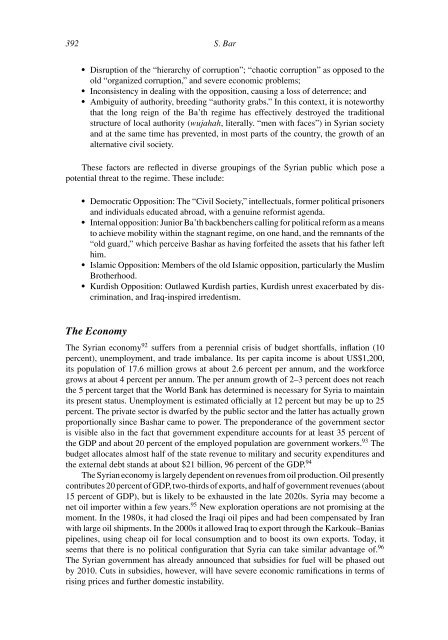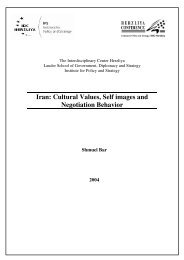Bashar’s <strong>Syria</strong> 391rule. Veteran ministers gradually were replaced by younger technocrats. 87 <strong>The</strong> first Basharal-Asad cabinet (December 13, 2001) saw more young technocrats appointed to senior positions.88 <strong>The</strong> Bashar era also ushered in a semblance of accountability for blatant failureon the governmental level. In September 2003, three years after Miro was appointed asprime minister, his government was defined as a “total failure” <strong>and</strong> he was replaced byNaji al-Otari, 89 who had served as deputy Prime Minister. <strong>The</strong> al-‘Atari cabinet includedan additional reshuffling of ministers that brought in even more young technocrats, whonow comprised half of the cabinet. 90 Still, Bashar did not dare appoint a “young guard”technocrat to the post of prime minister.Bashar has not tried to initiate change through the Peoples Assembly by changing <strong>its</strong>structure or <strong>its</strong> authority. <strong>The</strong> first elections to the Assembly during Bashar’s term of officewere held on March 23, 2003. Out of 10, 405 c<strong>and</strong>idates, 163 delegates were from theProgressive National Front, 132 represented the Ba’th Party, <strong>and</strong> 31 represented <strong>its</strong> satelliteparties. Nevertheless, the new Assembly was younger <strong>and</strong> fresher: 178 of the delegateswere new faces, most of them young.<strong>The</strong> Domestic Arena<strong>Syria</strong> presents to the world, but less convincingly to the <strong>Syria</strong>n public, the image of amonolithic state <strong>and</strong> society. <strong>The</strong> refrain of “national unity” <strong>and</strong> references to the citizensof the country as “brothers” or “family” are ubiquitous. <strong>The</strong>y appear in speeches, in officialslogans, <strong>and</strong> in the daily press. <strong>The</strong> regime does not allow expressions of communal identityto find their way into the media; the people of <strong>Syria</strong> are the “<strong>Syria</strong>n Arab People.” However,despite decades of enforced unity, <strong>Syria</strong> remains a country divided according to communallines. <strong>The</strong> stability that the country enjoyed for decades has been along an “equality ofmisery.” That is, citizens within <strong>Syria</strong> knew that they were all equally oppressed by theregime <strong>and</strong> that such suppression was the lot of citizens of other neighboring countries(Iraq)—or alternatively, the citizens of other countries, such as Lebanon, suffered fromendemic instability.<strong>The</strong> image of stability belies the reality, which under the surface is known to all <strong>Syria</strong>ns.This is the reality of “communalism” (ta’ifiya), or the primary (or even exclusive)identification of the individual with his ethnic or religious community. This is reflected inthe low rate of intermarriages <strong>and</strong> intermingling—even within the cities—<strong>and</strong> in a generalsense of acrimony among the different communities. But for the most part it does not seemto be at a level that would engender communal strife on the Balkan or Iraqi scale. Recently,tensions have flared up among Sunnis, Isma’ilis, <strong>and</strong> Alawites <strong>and</strong> between Kurds <strong>and</strong> theregime in northern <strong>Syria</strong>, <strong>and</strong> some have even deteriorated into small-scale conflicts. This,too, serves the regime, which projects an implicit warning that the only alternative to it isa return to the instability of the pre-Ba’th era, or even disintegration of the country <strong>and</strong>deterioration into a “Balkan” or “Iraqi” reality.<strong>Syria</strong> is faced by a serious threat to the stability of the regime. While this threat is notaccompanied by widespread violence, as in the period of the Muslim Brotherhood uprisingin the late 1970s <strong>and</strong> early 1980s, it is no less severe. <strong>The</strong>re is a general sense in the countryof decay of the regime <strong>and</strong> a disintegration of authority. <strong>The</strong> factors relevant to this situationinclude: <strong>The</strong> deteriorating economic situation; Signs of loss of control in peripheral regions, <strong>and</strong> even a weakening of the “implieddeterrence” that was always assumed by the regime, causing the populace to test thewaters of the regime’s tolerance 91 ;
392 S. <strong>Bar</strong> Disruption of the “hierarchy of corruption”; “chaotic corruption” as opposed to theold “organized corruption,” <strong>and</strong> severe economic problems; Inconsistency in dealing with the opposition, causing a loss of deterrence; <strong>and</strong> Ambiguity of authority, breeding “authority grabs.” In this context, it is noteworthythat the long reign of the Ba’th regime has effectively destroyed the traditionalstructure of local authority (wujahah, literally. “men with faces”) in <strong>Syria</strong>n society<strong>and</strong> at the same time has prevented, in most parts of the country, the growth of analternative civil society.<strong>The</strong>se factors are reflected in diverse groupings of the <strong>Syria</strong>n public which pose apotential threat to the regime. <strong>The</strong>se include: Democratic Opposition: <strong>The</strong> “Civil Society,” intellectuals, former political prisoners<strong>and</strong> individuals educated abroad, with a genuine reformist agenda. Internal opposition: Junior Ba’th backbenchers calling for political reform as a meansto achieve mobility within the stagnant regime, on one h<strong>and</strong>, <strong>and</strong> the remnants of the“old guard,” which perceive Bashar as having forfeited the assets that his father lefthim. Islamic Opposition: Members of the old Islamic opposition, particularly the MuslimBrotherhood. Kurdish Opposition: Outlawed Kurdish parties, Kurdish unrest exacerbated by discrimination,<strong>and</strong> Iraq-inspired irredentism.<strong>The</strong> Economy<strong>The</strong> <strong>Syria</strong>n economy 92 suffers from a perennial crisis of budget shortfalls, inflation (10percent), unemployment, <strong>and</strong> trade imbalance. Its per capita income is about US$1,200,<strong>its</strong> population of 17.6 million grows at about 2.6 percent per annum, <strong>and</strong> the workforcegrows at about 4 percent per annum. <strong>The</strong> per annum growth of 2–3 percent does not reachthe 5 percent target that the World Bank has determined is necessary for <strong>Syria</strong> to maintain<strong>its</strong> present status. Unemployment is estimated officially at 12 percent but may be up to 25percent. <strong>The</strong> private sector is dwarfed by the public sector <strong>and</strong> the latter has actually grownproportionally since Bashar came to power. <strong>The</strong> preponderance of the government sectoris visible also in the fact that government expenditure accounts for at least 35 percent ofthe GDP <strong>and</strong> about 20 percent of the employed population are government workers. 93 <strong>The</strong>budget allocates almost half of the state revenue to military <strong>and</strong> security expenditures <strong>and</strong>the external debt st<strong>and</strong>s at about $21 billion, 96 percent of the GDP. 94<strong>The</strong> <strong>Syria</strong>n economy is largely dependent on revenues from oil production. Oil presentlycontributes 20 percent of GDP, two-thirds of exports, <strong>and</strong> half of government revenues (about15 percent of GDP), but is likely to be exhausted in the late 2020s. <strong>Syria</strong> may become anet oil importer within a few years. 95 New exploration operations are not promising at themoment. In the 1980s, it had closed the Iraqi oil pipes <strong>and</strong> had been compensated by Iranwith large oil shipments. In the 2000s it allowed Iraq to export through the Karkouk–Baniaspipelines, using cheap oil for local consumption <strong>and</strong> to boost <strong>its</strong> own exports. Today, <strong>its</strong>eems that there is no political configuration that <strong>Syria</strong> can take similar advantage of. 96<strong>The</strong> <strong>Syria</strong>n government has already announced that subsidies for fuel will be phased outby 2010. Cuts in subsidies, however, will have severe economic ramifications in terms ofrising prices <strong>and</strong> further domestic instability.
- Page 4 and 5: Bashar’s Syria 355of political im
- Page 8 and 9: Bashar’s Syria 359a-Zur province
- Page 11: 362 S. Barof Lebanon, with which Sy
- Page 17 and 18: 368 S. Barnaturally come with the s
- Page 19 and 20: 370 S. BarSimilar behavior on the p
- Page 21 and 22: 372 S. Bardemocracy” must be foun
- Page 23 and 24: 374 S. Barcultural, political and m
- Page 25 and 26: 376 S. Barexcept for those with fam
- Page 27 and 28: 378 S. Barthe provisions for nonpro
- Page 29 and 30: 380 S. Bar The ups and downs in rel
- Page 31 and 32: 382 S. Barfamily is also linked by
- Page 33 and 34: 384 S. Bar2. The “second generati
- Page 35 and 36: 386 S. BarThe reformist trend withi
- Page 37 and 38: 388 S. Barwould allow the younger g
- Page 39: 390 S. BarFigure 3. Heads of the Sy
- Page 43 and 44: 394 S. Bar(Majlis Milli), composed
- Page 45 and 46: 396 S. Bar Other prominent Syrians
- Page 47 and 48: 398 S. BarSyrian civil society—su
- Page 49 and 50: 400 S. BarMany of the Muslim Brothe
- Page 51 and 52: 402 S. BarThese elements find reson
- Page 53 and 54: 404 S. BarIran’s proxy, Hezbollah
- Page 55 and 56: 406 S. BarWest—and specifically t
- Page 57 and 58: 408 S. BarBashar is well aware that
- Page 59 and 60: 410 S. BarBashar did not read these
- Page 61 and 62: 412 S. Bartoken withdrawal while ma
- Page 63 and 64: 414 S. Barlegitimacy had eroded. Ne
- Page 65 and 66: 416 S. Barin the wake of the al-Har
- Page 67 and 68: 418 S. BarIt was Russia, however, t
- Page 69 and 70: 420 S. Baror so, with competitive p
- Page 71 and 72: 422 S. Bar10. According to the well
- Page 73 and 74: 424 S. Bar44. See Flynt Everett, In
- Page 75 and 76: 426 S. Barinternet news site, all4s
- Page 77 and 78: 428 S. Bar100. As one Sunni Syrian
- Page 79 and 80: 430 S. Bar125. Radio Damascus, 21 O
- Page 81 and 82: 432 S. BarBengio, Ofra and Gabriel
- Page 83 and 84: 434 S. BarNews agencies and Newspap
- Page 85 and 86: Regional Command;Central CommitteeR
- Page 87 and 88: Main Figures in the Syrian Ba’th
- Page 89 and 90: Main Figures in the Syrian Ba’th
- Page 91 and 92:
Main Figures in the Syrian Ba’th
- Page 93 and 94:
Main Figures in the Syrian Ba’th
















